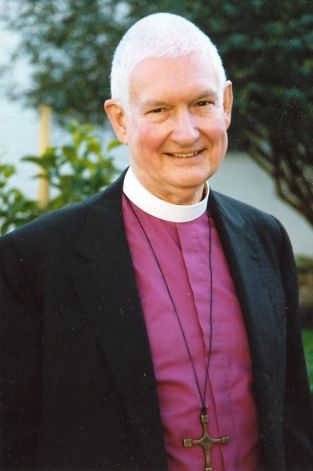In earlier interviews, he says he remained in the closet for so long because he thought the truth would be too hard on the diocese, his family, and his wife.
Then came debates in the Episcopal Church over homosexuality. "I sat quietly during all of that rhetoric while bishops were speaking out of no knowledge and great prejudice," Charles told KQED's Scott Shafer in 2009. "And their whole attitude was, this was a great illness and you just had to go to the bottom, and finally you get saved and everything would be fine."
It was the catalyst that moved him. He told the San Francisco Chronicle in 2004:
"I was ashamed of myself for remaining silent when the church was involved in an acrimonious debate about the whole question of gay people in the life of the church. I couldn't live with that any longer," he said. "I came to realize that I was only going to wither and die and it would be a destructive relationship for my wife and myself."
In a letter to fellow bishops, Charles wrote, "I will not remain silent, invisible, unknown."
In fact, Charles, who retained his bishop's rank after his retirement and membership in the church's 300-delegate House of Bishops, was politically active. He was arrested in 1999 at the national Episcopal convention in Denver in a protest over the church's treatment of gays and lesbians. In 2003, he was a delegate to the Episcopal convention that approved the election of Gene Robinson as bishop of New Hampshire. He also participated in antiwar causes.
Rev. Jay Johnson, an Episcopal priest and lecturer in theology and culture at the Pacific School of Religion in Berkeley, knew Charles for more than 15 years.
"It’s important for people to realize who did not know him personally what a simply wonderful man that he was," Johnson said, "friendly, charming, insightful, always keen to be learning, always keen to be pushing both church and society further toward that image that he believed was the essence of Christian faith and of the gospel, and that is everyone is welcome at the table, and he certainly lived that way himself. That will be greatly missed, by many."
At age 76, Charles met his partner. He and Felipe Sanchez-Paris, a retired professor and political organizer, married in a church ceremony in 2004, and were legally married in 2008, during the pre-Prop. 8 window in California.
"When he met and his relationship with Felipe Paris developed, he became even more concerned and involved in immigration rights and all sorts of areas around economic and social justice," Johnson said. Sanchez-Paris died in July.
Rev. Susan Russell, an Episcopal priest in Pasadena, wrote in the Huffington Post:
Otis Charles was part of the bridge generation — those who dared to reach across the chasm of what was to what could be — building a bridge to somewhere. Those who had no examples of how to live authentically as LGBT people and so became examples for those who came after them. Examples of how to tell the truth about their lives — even after decades of denial to themselves and to others. Examples of how to claim the blessing of God's presence in their life and in their love as a witness to a work of healing, of hope, of wholeness.
A memorial service will be held at 2 p.m. Jan. 11 at St. Gregory of Nyssa Episcopal Church, 500 DeHaro St., in San Francisco.
KQED's Alex Emslie contributed to this report.
